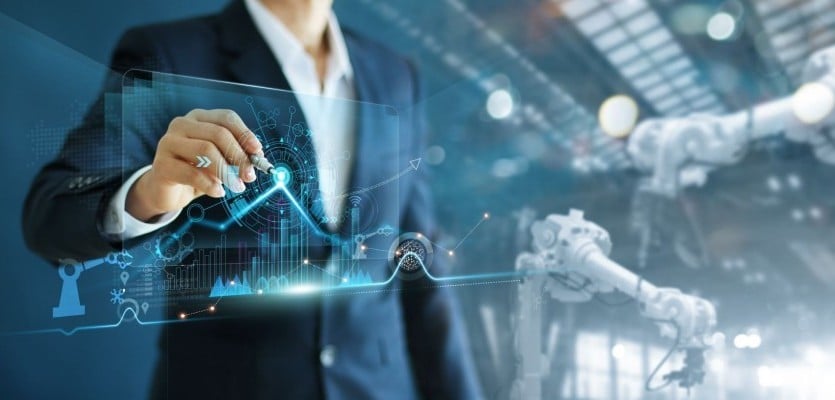Free UK Shipping over £100
Fast Shipping
Worldwide Shipping
Technical Sales Team

You may have heard the term Industry 4.0 being thrown around for a few years now, but what does it actually mean? At the minute a significant transformation regarding the way we produce products is changing due to digital developments within the manufacturing industry. This transition is being called Industry 4.0 representing the fourth revolution that has occurred in manufacturing.
However, this transformation hasn’t happened overnight and there has been a lot of trial and error over the last couple of years and the outcome of some new developments has been hard to predict at times. But now with new developments from industry leaders, the aim is to reduce the amount of trial and error by using new simulation and AI developments.
Traditional manufacturing companies are under pressure to keep up with this rapid digital change, which disrupts the way development, production, and the entire logistic chains have previously worked. Industry 4.0 developments have introduced intelligent robots, 3D printers, drones, sensors, and much more to daily operations.
The industry 4.0 environment: Source- 2015 Deloitte Industry 4.0 report

CPP stands for Critical Process Parameters
Industry 4.0 has four main characteristics: Source- 2015 Deloitte Industry 4.0 report

The first development is asset performance in connection with cloud technologies. The second and the current focus is the simulation in the framework of plant operation. These developments and industry-specific solutions are very closely orientated towards customer requirements and expectations. Another key area of focus is on flexibility ( e.g The variation of batch sizes) and the optimization of quality and productivity overall. This can usually be implemented effectively using simulations.
Let’s start with asset performance, as we know operators and owners of plants within the process industry work hard to reach the highest possible operational efficiency. The latest AI development named The Asset Performance Suite is a plant asset management solution. The Asset Performance Suite supports predictive maintenance and provides opportunities supported by AI to achieve the highest reliability and efficiency every time.
Asset performance allows you to be able to simply connect, manage and analyse data across your whole business. This development also makes it easier to make strategic decisions based on advanced asset intelligence data.
Secondly, we take a look at the latest framework simulation for plant operations Siemens’ new control system, the Simatic PCS 7 neo offers web-based multi-user capacities which have addressed issues in line with the latest industry trends and making engineering much easier.
Simatic PCS 7 process control system is one of the most open control systems on the market. The results they have seen from their open simulation framework approach have allowed them to continue to pursue this strategy of simulating the entire lifecycle through vertical and horizontal integration.

The development of Industry 4.0 is ever-changing and it is important to prepare for what is coming next and how we can adapt. The next challenge will be expanding into other application fields and turning that potential into business value at scale. This will involve overcoming several challenges such as;
Start embracing digital and AI today and see our range of Siemens digitalisation products available to purchase online. You can also find out more about Siemens SITRANS IQ/CC240 in one of our latest articles.
Contact our technical sales advisors here.
Our team of engineers are fully equipped to provide bespoke system design and manufacture.
This process involves specifying, procuring, calibrating and maintaining instrumentation and control systems for industrial and commercial process control applications.
Call our technical sales team for advice

This site uses cookies to monitor site performance and provide a more responsive and personalised experience. You must agree to our use of certain cookies. For more information on how we use and manage cookies, please read our Privacy Policy.